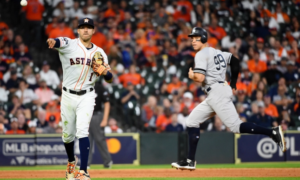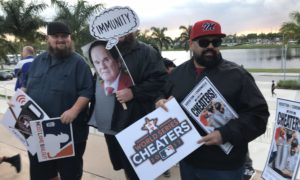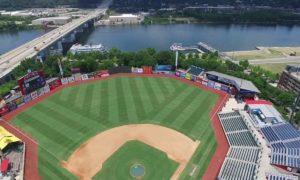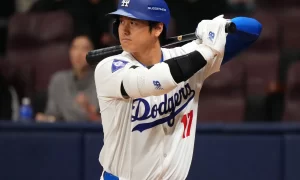The Automatic Strike Zone is All About $$$
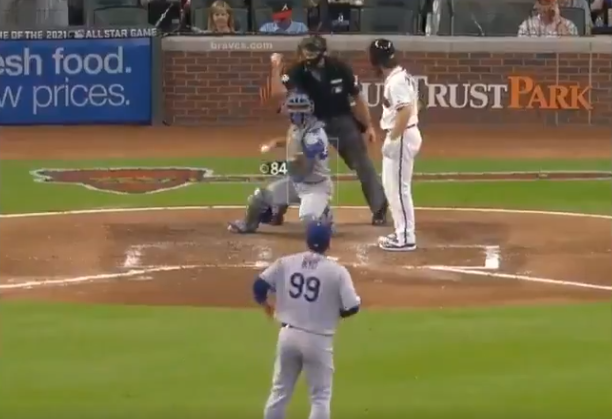
The Hall of Fame is a hot topic this time of year. Every Hall-related topic is a lightning rod- be it the current ballot, the “inner circle,” or the worst HOFers. On that last subject, the least deserving plaque in the Hall doesn’t belong to High Pocket Kelly, Jesse Haines, or even Harold Baines. The worst Hall of Famer is Bowie Kuhn- the bumbling, anti-labor commissioner who repeatedly got his ass whooped by MLBPA head man- and newly elected HOFer- Marvin Miller.
Kuhn was especially fond of using the “best interests of baseball” clause. He vetoed trades and transactions, suspended past and present players (including Willie Mays and Mickey Mantle), and basically whatever else he wanted. Almost never was the “best interests” clause invoked in a way that actually protected the best interests of the game. This is because the operators of the sport – owners and their commissioners- have only ever had one driving interest: money.
Keep in mind that turning a substantial profit is not antithetical to running the sport well; it’s quite possible to do both! But MLB all too frequently demonstrates they only care about the former and not the latter. The upcoming automatic strike zone is the latest example.
The Automatic Strike Zone
Last week, MLB reached a tentative, five-year collective bargaining agreement with the MLB Umpires Association (MLBUA). The full details won’t be released until both sides ratify, but the umps agreed to some version of an automatic strikes/balls system.
MLB has test-driven an automatic zone in other leagues- most notably the independent Atlantic League and the Arizona Fall League. It did NOT go well.
TrackMan Strikes Again … pic.twitter.com/xh9C8Gsze1
— Josh Norris (@jnorris427) October 13, 2019
Not only were both pitchers and hitters displeased by the zone as called in those test games, but it also appears to cause a noticeable delay. It takes a few heartbeats of bewilderment after the catcher’s mitt pops before the ump makes the call. This can only decrease the fan experience, as commissioner Rob Manfred repeatedly thumps his pace of play war drums. (More on that in a bit.)
This delay will be annoying in person or on television, but excruciating for radio listeners. Any Yankee fan knows all too well that John Sterling’s biggest pet peeve is slow home plate umpires (well, that and the artificial noise in Tampa Bay). He’s absolutely right to despise this; it’s his job to relay the events on the field through audio with no visual, and slow calls make radio less listenable. Now, every umpire could become Sterling’s worst nightmare.
“Best Interests”
The automatic strike zone is going to weaken the fan experience while infuriating players and probably umpires. As such, it both is and isn’t in the “best interests of baseball.”
Let’s start with isn’t, because it’s the most obvious. Unless technology becomes MUCH better and faster at calling balls and strikes, the automatic zone will only be a negative. If no one is happy, it will be definitively bad for baseball.
However, in the classic usage of the clause in question, it has almost always been about money- either directly or indirectly. The MLB Umpire’s Association (MLBUA) probably (hopefully?) received improved compensation and working conditions as part of their new agreement. The automatic strike zone puts them on a slippery slope, though. With the advancing creep of automation, how long will it be before MLB decides they no longer need four umps on the field? Then, if they can get by with just three, why not two? How about one, or none at all?
It’s not hard to foresee how Manfred and MLB could use this to turn umpires into dinosaurs. Maybe this won’t happen during the newly-signed five-year CBA, and maybe not even the one after that. It seems only a matter of time, though, before MLB extricates from their employees in blue, and maybe rids themselves of the MLBUA altogether.
We can’t fully judge the deal until it becomes public, but it seems like the MLBUA may have signed its own death warrant. That would save precious dollars for MLB owners (even though every ump earns less than the MLB player minimum, and MLB’s annual revenue is nearly $11 billion). In this more sinister sense, the automatic strike zone absolutely fits with Kuhn’s beloved “best interests” clause.
Pace of Play
Manfred’s favorite hobby-horse is pushing his pace of play initiatives, you know, for the best interests of baseball. Except… that never smelled quite right, and it’s all the more rancid with the pace-incompatible automatic strike zone.
I’ve written before about how, despite all of Manfred’s bluster about pace of play, game lengths have only increased. The average game was ten minutes longer in 2019 than it was in 2015. Even more egregiously, playoff games were 28 minutes longer than regular season contests. Robot umps next year will only make it worse.
What if this isn’t an accident? Could this be intentional rather than gross incompetence?
Before the 2019 season, Manfred’s pace of play ideas were laid out not as stand-alone edicts, but as part of a list of labor-related negotiables with the MLB Players Association.
Management presented its latest proposal Jan. 14, one that included a requirement that pitchers face at least three batters or finish an inning. Players responded Feb. 1 with a broader plan, renewing their push for the D.H. in all games, an earlier trade deadline aimed at discouraging teams with losing records from trading stars, increasing service time for top young stars called up early in the season, and rewarding and penalizing teams in the draft based on their records.
Associated Press, February 8, 2019
Due to the machinations of Manfred, there is a close connection between pace of play and collective bargaining. It’s not hard to envision MLB and the MLBPA at the bargaining table, with Manfred demanding that the players accept concessions to help speed up games. After all, we all want what’s best for baseball, don’t we?
Could Manfred and MLB be so devious as to invent a pace of play problem, exacerbate it artificially, then strongarm the unions into “fixing” it? Would they go this far to create better negotiating leverage for owners? It might seem far-fetched, but the new evidence of the automatic strike zone makes it that much more plausible.
Manfred, like Kuhn before him, does not have the best interests of baseball in mind. Every decision is driven by money, and we need to evaluate them in that context. There’s no good reason for MLB to demand that the umpires accept the currently-faulty automatic zone, except to eventually replace paid employees with automation.
When we accept the magnitude of MLB’s greed, everything becomes clearer. As John Sterling would say, “That’s baseball, Suzyn.” It certainly was under Kuhn and continues to be true under Manfred.

